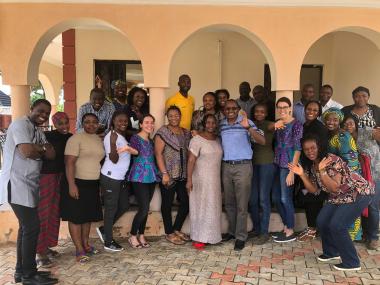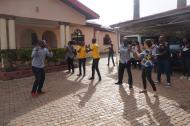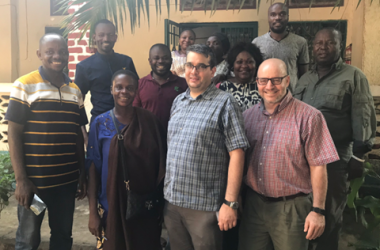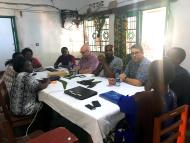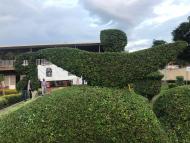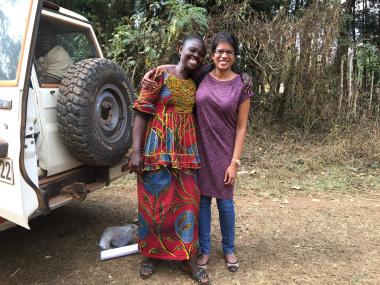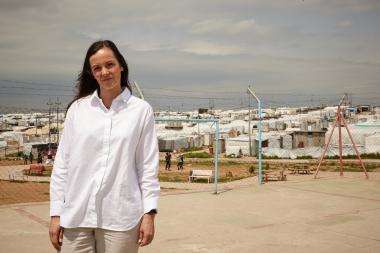Supporting women who live in war and conflict takes a team of people from many different backgrounds and skillsets. This summer, many members of our team at HQ collaborated with our on-the-ground country teams to share resources, knowledge and their skills to help each country team better serve women in their communities.
Get to know some of our staff and about their recent trips to the places we work. With perspectives from human resources, information technology, program, and leadership, each one shines a different light on our work.
Genevieve McGann, Senior Global HR Officer
What did you do and learn on your recent trip to Nigeria?
As a member of our global HR team, our visit had two purposes: to build relationships and understand our work on the ground, and to do an internal assessment of how HR is doing within the office.
Our staff in Nigeria are incredibly hospitable and fun! One of my favorite things they do is that every Friday, they have an hour-long exercise class outside the office where they play music and do cardio, dance, stretch, etc. Everyone from the Country Director to the drivers participates. It was an awesome reminder that breaks are important, and we all need to take care of ourselves, too. We’re now thinking about implementing it in other country offices or even at HQ – so a great example of the Country Office providing us with new ideas!
We also visited an economic empowerment training in Bauchi. The main vocational track in Nigeria is agriculture, and in this session, the women were learning the power of trading. Most of the women were only used to subsistence farming so trading was a new concept for them. The trainer was educating them on the value of trading for themselves—and also for the community. It was really inspiring to see how engaged the women were and how valuable this training was to them and the impact it would have on their lives and their families’ lives.
What inspired you to join Women for Women International?
My background was in domestic human resources, so I was interested in joining Women for Women International because I wanted the opportunity to be involved in international HR. I was fortunate they were willing to train me on the global side. I’ve stayed for three years because I’m constantly growing professionally, but I also fell in love with the mission and work we do.
What’s the most rewarding and most difficult part of your work?
The most rewarding part is seeing how what I am doing on a day-to-day basis—whether it’s recruiting for a role at HQ, supporting compensation surveys in Nigeria, or providing training on safeguarding in Iraq—has a direct effect on our staff and how they serve the women in our program. I love knowing I am making a difference and helping our staff do their jobs effectively.
The most difficult part is being so far away from my colleagues in the Country Offices! The time difference poses challenges, but also nothing is more valuable than face-to-face conversations. It makes visiting our Country Offices or meeting up with our Country Office staff that much more special and valuable.
What do you hope to see from your work and Women for Women International in the future?
From an HR standpoint, our goal is always to best support the organization and its people to carry out our incredible mission. I’m excited every day to work with our staff on the ground, who have a direct impact on the lives of women in the most marginalized communities. I’m excited to be a part of the organization’s ambitious goals to double the women we serve and have an even greater impact on the community.
What advice to do you have for people who are inspired by your work and want to get involved?
First, sponsor a woman! I’ve sponsored a woman in our program since I started at Women for Women International. I’ve loved being able to support in that way, but it’s also a really helpful way to learn about us, the women we serve, and our program.
Second, be curious! I didn’t have a background in international development, but when I first learned of Women for Women International, I was immediately drawn in. I’ve been here for three years now and am still constantly learning from our staff and the work that we do. If you’re curious and passionate, almost everything else can be learned.
Marc Nations, Global Systems and Network Administrator in Information Technology
What did you do and learn on your recent trip to Rwanda and the Democratic Republic of Congo?
Our trip had two primary purposes: First, we wanted to see our operations in action in DRC in our two main offices – Bukavu and Uvira. The second purpose was to conduct a global IT meeting in Rwanda. We were also able to conduct a site visit to a training location for Rwandan women where we got to see our program in action.
Watching women work together in the training center really proved to me that collaboration and team work make many things possible. I also enjoyed meeting with my IT colleagues to discuss our current work and challenges. These discussions and interactions helped me appreciate the effort it takes to get IT work done in the field offices.
What inspired you to join Women for Women International?
I was very excited to join Women for Women International over five years ago because of the mission training women.
What’s the most rewarding and most difficult part of your work?
The best part is being able to work with people doing extraordinary things to train women. The countries we work in are very challenging, so overcoming these impediments to work with women to raise their capabilities is inspiring to me.
The difficult part of my work – and the organizations efforts – is the conditions we all have to work in in the country offices. Poor infrastructure and unreliable services can be quite difficult to overcome.
What do you hope to see from your work and Women for Women International in the future?
I would like to see us further our technical capabilities so we can continue to work with more women in the field.
What advice to do you have for people who are inspired by your work and want to get involved?
Always look for an opportunity to contribute no matter what your 'job' is. There are always opportunities to learn and grow that may not fall under your area of responsibility.
Saba Ghori, Senior Associate Director of Social Empowerment Program Design & Development
What did you do and learn on your recent trip to Afghanistan?
I traveled to Afghanistan to participate in a two-day What Works workshop to discuss with the staff the programmatic implications of the What Works study on whether our program was helping to reduce intimate partner violence. As part of the workshop, I participated and presented for a DFID meeting.
I met with the Social Empowerment staff and Men’s Engagement staff to discuss the new Social Empowerment curriculum and reinforce key social empowerment concepts related to gender-based violence.
The community has been plagued with war for decades. Many of the women in our community were refugees in Pakistan and unable to complete their education. They love the Women for Women International program and want more opportunities to learn and work.
I also met with a group of Community Protection Committee members and Change Agents. One of our Change Agents was extremely inspiring and a true leader. In response to damage in the community as a result of flooding in Nangahar, she led efforts to rescue children and older men. Our Change Agent took the initiative to meet with the Governor of Nangahar and asked for assistance following the floods. The Governor committed to surveying the community and providing clean water, hygiene kits, and toilets. He gave them rice, salt, sugar, and 1900 Afghani people who could help.
What inspired you to join Women for Women International?
I joined Women for Women International after working for the US Government for more than a decade because I wanted to be closer to the work on the ground. For many years, I had been meeting with amazing women’s rights activists and giving out grants to different women’s rights and human rights organizations. I wanted to work with an organization whose mission and vision I value and admire, one that works for the most marginalized women at the grassroots level.
What’s the most rewarding and most difficult part of your work?
The most rewarding part of my work is meeting with our Country Office colleagues and seeing our program being implemented at the grassroots level. I love to meet with the women and men who are in our program. I love to design new programs and projects.
The most challenging part of our work is fundraising, because one can spend a lot of effort and hard work trying to raise funds, and it can get disheartening when you don’t get the results you want. That said, when you are successful, it is even more rewarding because of how challenging it is.
What do you hope to see from your work and Women for Women International in the future?
I hope that we can raise more funding and get additional grants so that we can reach more women and men. I also hope that we can expand our work through the Conflict Response Fund and are able to address the most urgent crises in the world. I would love to directly address the urgent needs of survivors of violence, like providing them with legal aid, health services, or psychosocial support.
What advice to do you have for people who are inspired by your work and want to get involved?
This is the most rewarding work you can do. If you are interested in working for a nonprofit, look for the right opportunity to do so. There are also many opportunities to volunteer, fundraise, and sponsor a woman from one of the countries we are working in.
Brita Fernandez Schmidt, Executive Director at Women for Women International – UK
What did you do and learn on your recent trip to Iraq?
Earlier this year I travelled to Erbil, in the Northern part of Iraq (KRI), to meet my colleagues in the Iraq office, meet the women we serve, understand the context and the challenges and see the impact of our work. In November last year, 265 women graduated for the first time from our year-long training program and this year we have enrolled 700 more women.
Like many of our other programs, in Iraq we serve women from many different communities— Syrian refugees and internally displaced women and women from the KRI. Many of these women were violently forced from their homes. Through our program, they are finding a space where they can come together and heal.
I had the privilege of meeting several women who graduated from our program last November. One inspiring example of the impact of our work is the tailoring business ‘Hania’, formed by five of our graduates, who after graduating received a business start-up grant from us. I spent a few hours with them. They now have a small shop above their home and have printed business cards that they distribute in the neighborhood to attract business. They are earning an income and they are using the skills they learned in our program.
I’ve been so inspired by our Country Team and our partner, the Free Yezidi Foundation, who work in the Khanke camps where many of Yezidi women have lived for years. Yezidi refugee women can now access classes where they can learn skills or do activities like yoga and art therapy, but most importantly they’ve been able to get access to psychosocial counseling, which has been crucial for women who have experienced sexual violence as they escaped ISIS.
What inspired you to join Women for Women International?
I have always been passionate about helping women to fulfill their potential. I fundamentally believe that you can’t empower someone else. You can only empower yourself, but what you can do is provide a support network and tools.
That’s really what Women for Women International does. Through our program – and the knowledge, skills and confidence our participants gain – women empower themselves. It is so inspiring to play a role in that.
What’s the most rewarding and most difficult part of your work?
The most difficult part is seeing the devastating impact of gender inequality first hand – we work with women who experience violence and poverty on a daily basis, to an extreme level that makes their lives unimaginably hard. When you see how this suffering and injustice is so deeply rooted in social norms, that we are all conditioned to accept – the problem can seem so complex and daunting.
Yet I have also been privileged to see how women are capable of changing not only their own lives, but also the world around them, if they have the right tools and a supportive environment.
In my 10 years at Women for Women International – UK, I have had the opportunity to follow and support women throughout their journeys. It is amazing to watch them grow into successful, confident business women, leaders, and vocal advocates for women’s rights.
What advice to do you have for people who are inspired by your work and want to get involved?
The most important advice I often give is that we are all stronger than we think and we are all capable of doing so much more than we think possible. If you feel passionate about something but you do not pursue it because you think you are not able to, then I would say to you, you can.
I hope through our work people learn that change is possible, even in the most difficult circumstances, and there is something we can all do to support other women. It can be as simple as sharing a woman’s story and helping to amplify her voice and using your own voice and the tools at your disposal to challenge gender inequality and violence against women. You can also provide direct support to help a woman empower herself, by sponsoring a sister through our one-year program.

